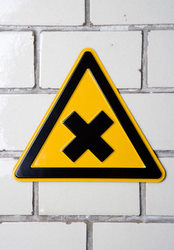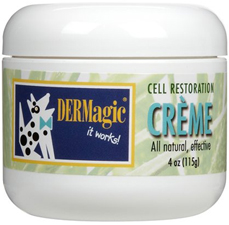- Where to start
- Parasites that cause itchy skin
- Common dog allergens
- Dog skin infections
- Chemicals that cause itchy skin
- Natural treatments for itchy skin
“Over 75 percent of my cases are dogs that scratch excessively. These dogs may have an itchy rash, they may have hair loss from scratching, or they may just scratch incessantly. We see more itchy dogs than itchy animals of any other species, including cats and horses.” – Dr. Kinga Gortel
So if itchy skin is so common, there must be effective treatments out there, right?
As we’ll explore below, causes of dog itchy skin include parasites, allergens and skin infections and there are effective natural treatments for each one…
Where to Start: Diagnosing Dog Itchy Skin
Diagnosing the root cause of your dog’s itchiness starts with the affected body part. For example…
- Flea allergy – the itching will occur over the rump and around the neck area, because fleas live in those locations on a dog’s (or cat’s) body.
- Sarcopitc mange mites live on the elbows, tips of the ears and chest area, so that is where the itching will occur.
- Inhaled allergies, called atopy, cause itching on the tops of a dog’s feet, up the front legs, in the corners of mouth and around the eyes and ears because histamine is located in highest concentration in those locations.
Therefore, depending on the location of WHERE the itching is occurring will probably give you some clue as to WHAT caused the itching, and what tests your vet should conduct to confirm the diagnosis, whether there is a rash present or not.
Treatment, however, will vary depending on whether there are any additional symptoms present (in addition to the itchiness). For instance, homeopathic remedies will vary depending on whether there is itching with eruption versus itching without any eruptions.
Continue reading to learn more about the potential causes of itchy dog skin…
Parasites that Cause Dog Itchy Skin
Parasites attach themselves to your dog and cause itching and discomfort.
Following are the common parasites. Please click on the links for detailed information about the treatment and prevention of each:
Common Dog Allergens
Dog skin allergies are another main cause of dog itchy skin. The process of figuring out exactly what your dog is allergic to can be difficult.
Fleas are the most common culprit, making prevention essential in the fight against dog flea allergens. Most dogs with fleas will scratch to some extent, but a dog with flea allergy is miserable after only one flea bite. See our Dog Flea Medicine page for flea treatment and prevention advice.
“The next most common allergies are environmental and due to seasonal pollens, molds, and insects and non-seasonal allergens such as house dust and house dust mites. Environmental allergies are similar to those people have. However, people usually sneeze and get a running nose and eyes, and dogs usually itch.” – Dr. Kinga Gortel
Dog food allergies caused by one or more ingredients in the dog’s diet are less common but can be more severe.
Figuring out the exact food allergy will require putting the dog on an elimination diet.
We have compiled a step-by-step guide to help you through the allergen elimination process in the “How to Diagnose Your Dog’s Food Allergy” section of our Dog Food Allergy page.
Dog atopy is present when a dog is allergic to various environmental allergens such as pollen, molds, house dust mites and animal dander. Itching is the primary symptom, especially around the face, feet, lower chest and belly. The scratching that results can cause hair loss and hot spots to develop in those areas.
See our dog atopy / environmental allergens section for more information.
Dog Skin Infections
There are different types of skin infections that can affect your dog. Try to remember that your dog may react uniquely to a certain skin disease or may be suffering from a combination of a few skin conditions.
One of the main causes of dog skin disease are bacterial and yeast infections. These can cause excessive scratching and are usually brought on when a dog’s immune system is low because of stress, illness or allergies.
Bacterial infections may look like small round bumps on the skin and could cause hair loss as a result of excessive scratching.
A dog yeast infection my have a foul odor and a greasy appearance. They can develop in different areas of the dog’s body.
Chemicals that Cause Dog Itchy Skin
Sometimes it’s easy to forget the products and chemicals that we use to beautify and protect ourselves and our homes can be dangerous — even deadly — to our dogs.
Make a conscious effort to purchase organic, natural and safe sprays for your home. If a product is questionable, don’t use it! And if you just must…then keep your dog far away.
The following is a list of potentially harmful sprays and chemicals that you might have lying around your house.

- Carpet cleaners, deodorizers, and brand new carpet
- Cat litter
- Cement
- Certain medications such as neomycin
- Chlorinated water
- Dishwashing detergents
- Disinfectants
- Fertilizers
- Home furnishings, fibers, dyes, polishes and cleansers
- Lanolin
- Leather and metal collars (click here for top reviews of safe adult and puppy collars and leashes)
- Rubber and plastics
- Soaps and shampoos, petroleum-derived products
This list merely scratches the surface of possible irritating chemicals to keep far away from your dog.
A good rule of thumb? Keep most man made products in a place your dog can’t get to.
Natural Treatments for Dog Itchy Skin
One of the best all-encompassing natural treatments we’ve found for relieving itchy skin is DERMagic Cell Restoration Creme. It contains several natural ingredients that promote healing and soothe discomfort, including aloe, shea butter, Vitamin E and sesame oil.
For your preventive and natural treatment options for itchy skin, see our Dog Skin Conditions page. Your at-home dog treatment options discussed there include…
- Adding a preventive supplement to your dog’s diet
- Dog fasting
- Additional diet supplementation options
- How to clean and treat the effected area
You can also continue to research potential dog itchy skin causes and treatments by clicking the following links based on your dog’s symptoms:
| Conditions | Symptoms |
|---|---|
| (click below links for more information) | |
| Dog Ear Infection |
|
| Dog Fleas | Persistent biting, nibbling and/or scratching different areas of the fur or skin. |
| Dog Lice | As with fleas, persistent biting, nibbling and/or scratching different areas of the fur or skin. Lice are much less common than fleas, so look closely to confirm which one you are dealing with (click links to learn what they look like). |
| Dog Mange |
|
| Dog Ticks | Dogs will often show no symptoms, but you can easily spot ticks attached to the skin – another good reason for frequent dog grooming. |
| Dog Yeast Infection (especially in the ear) |
|
| Dog Food Allergy | |
| Ringworm | Ringworm is a fungus, not a worm. It begins as a small bump which expands into a ring that slowly grows larger. In addition to the “ring” itself, other symptoms include:
Ring-Ex is an excellent natural remedy. It contains a blend of natural, herbal ingredients in a medicinal olive oil base, all specially selected to treat ringworm infections. Ring-Ex will also help to prevent the spreading of ringworm to other areas of the body and reduces the chances of ringworm recurring after having cleared up. Additional home treatment options are those listed on the main dog skin conditions and disorders page. |
You can also review related questions from other visitors here: Ask a Vet Online Library – Dog Skin Rashes, Marks, Spots, Lesions & Patches (including itchy skin and mange) Section

